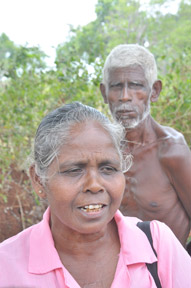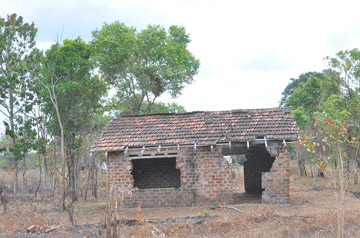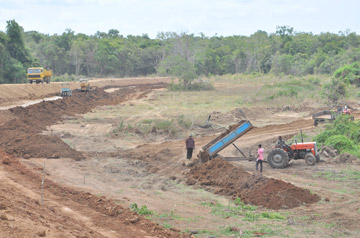|
Determined to restore Vavuniya's greener past:
Konwewa villagers return to their homesteads with renewed hopes
By Dhaneshi Yatawara
Northern elections ended, people voted and went back home.
Politicians won and many others commented and criticised on rights and
freedom, yet no one spoke about a certain faction of people who are
still struggling to make their living, trying to make the ends meet.
 |
|
Kusumawathi and Piyasena |

The house where one family was burnt in 1992 |

Konwewa reservoir development |
Though many extremists air their voices on things that happened in
the past those civilians, who lived and fought with the hard earth to
make a better harvest, more food for their children, would like to get
back to the lands they lived for decades. To many that was the only
piece of land on earth that belonged to them.
Konwewa is one of the few remaining villages in a remote part of
Vavuniya, struggling to rise. The village reservoir will soon be
complete after repairs. Thus, the villagers can cultivate only one
agriculture season.
On our way to see the reconstructing Konwewa (village reservoir of
the Konwewa village) we met U.B. Kusumawathi and M.M. Piyasena - husband
and wife in their early sixties who have come back to the remains of the
house they built when they were a newly married couple. Piyasena cannot
hear much so instead of making us speak in a slightly louder voice,
Kusumawathi began their life story.
Bitter struggle
Though their lives were filled with love and affection, the entire
story reveals the bitter struggle of a courageous soft spoken woman; not
only her, but all those women who were living in Konwewa. Most of them
came with their husbands to start a new life yet the life had become
harder than usual with terrorists threats that were intense in those
areas at that time of history. LTTE terrorists took these peoples' lives
for their bloody demands.
"We were displaced three times due to LTTE attacks. Each time we left
our village we returned home after months or few years and started our
lives from scratch," said Kusumawathi. This was the story of many
villagers of Konwewa.
In 1992 when LTTE attacked, Kusumawathi and Piyasena cuddled their
three sons, took few of their meagre belongings and left Konwewa reached
Parakramapura to her mother's ancestral home. With nothing belonging to
them at Parakramapura they earned their living as working for others as
peasants on daily wages. All the Konwewa inhabitants were farmers by
profession. And this was the fate of most of them who were lucky enough
to survive dreadful massacres.
"We left the village somewhere around 1992 when the LTTE attacked,"
she said.
Every time Konwewa was attacked Kusumawathi and her husband took
their children and few clothes to live with Kusumawathi's parents home
in Parakramapura. All her sons are now married and are settled down in
Padaviya and Parakramapura areas.
Kusumawathi said there were minor attacks throughout those days and
one day around wee hours, the LTTE destroyed the Army post that was
providing security to their village. Earlier attacks were thwarted by
the Army but this particular attack had been quite heavy.
Villagers had run into hiding, some to the jungle while some jumped
in to one of the bunkers that was built by them for safety. Those who
were packed in the bunker were bombed and burnt leaving only few
survivors and those were at the base. There were children, women and men
- young and old.
The villagers used to move to places where the Army had established
security points. "People who were living a bit far from the village
moved to places close to Army points and were living there temporarily
for safety," she said.
"My youngest was just an infant those days. Certain days we hide in
the jungles and in caves carrying our babies," Kusumawathi said.
Even-though there were no attacks on some days the villagers used to
hide in the jungle from the evening of the previous day till morning
next day.
"On rainy days we would keep our little ones on our lap and covered
ourselves with an umbrella when we are hiding in the jungles. We
suffered a lot in trying to safeguard our village," she said.
"One of my sons would sit up when he hears gun shots while asleep -
even from a far. And cries throughout the night begging me and my
husband to take them to our jungle hideout. Children, though they are
grown up and now living peacefully, went through a very traumatic
period," she said.
These attacks were not confined to few weeks or months. These
villagers were brave enough to live through this agony for couple of
years.
Kusumawathi recalled her inconsolable memories of losing her nearest
and dearest people. She said one dreadful incident happened many times
to many of the villagers. "The LTTE terrorist burnt people inside their
houses and families were killed like this," she said in reminiscence of
the dreadful past she was lucky enough to pass on, alive. And remains of
one such house is still in Konwewa empty and ghostly as no member of
that family have survived.
Many days villagers were hacked to death with knives and daggers by
LTTE .
Cultivate
"When we left these villages we did not have land of our own to
cultivate. Now when we are back in our own land, at least we have paddy
fields to cultivate," said Kusumawathi.
About ten families have come back. Until the village reservoir
completely repaired the villagers can only work for one agri season of
the year. They make their own seed paddy and paddy harvest is only for
their own consumption.
"After peace, we waited to return to our home and when the government
officials said the lands were cleared and safe to be resettled we came,"
she said.
There was no road when they came. They had to clear the jungle to
make the old path for the village. Today they have a gravel road. "We
need more help. We did get Rs. 150,000 to rebuild the house,"
Kusumawathi said.
Through the Government development programs slowly but steadily the
roads and other infrastructure is coming up. Until September 2012 the
focus of the Government was to resettle the displaced people who were
living in welfare centres Vavuniya who were mainly of the Tamil
community. The entire focus was to develop their homelands, their
livelihoods and their entire life structure.
By September 2012, the Government completed resettling all the people
living in the welfare centres in Vavuniya. All the Tamil people are
resettled in their own places. And now these days the Sinhala people are
coming back to their villages. These people are still getting resettled
particularly in the Vavuniya district, Welioya area and certain parts of
the Anuradhapura district which borders the Vavuniya district as well as
Mannar.
According to records in Mannar there had been 7,000 Sinhala people
and even today none have come back. It is the duty of authorities to
identify these original settlers and let them have the right to live on
their home land. |

